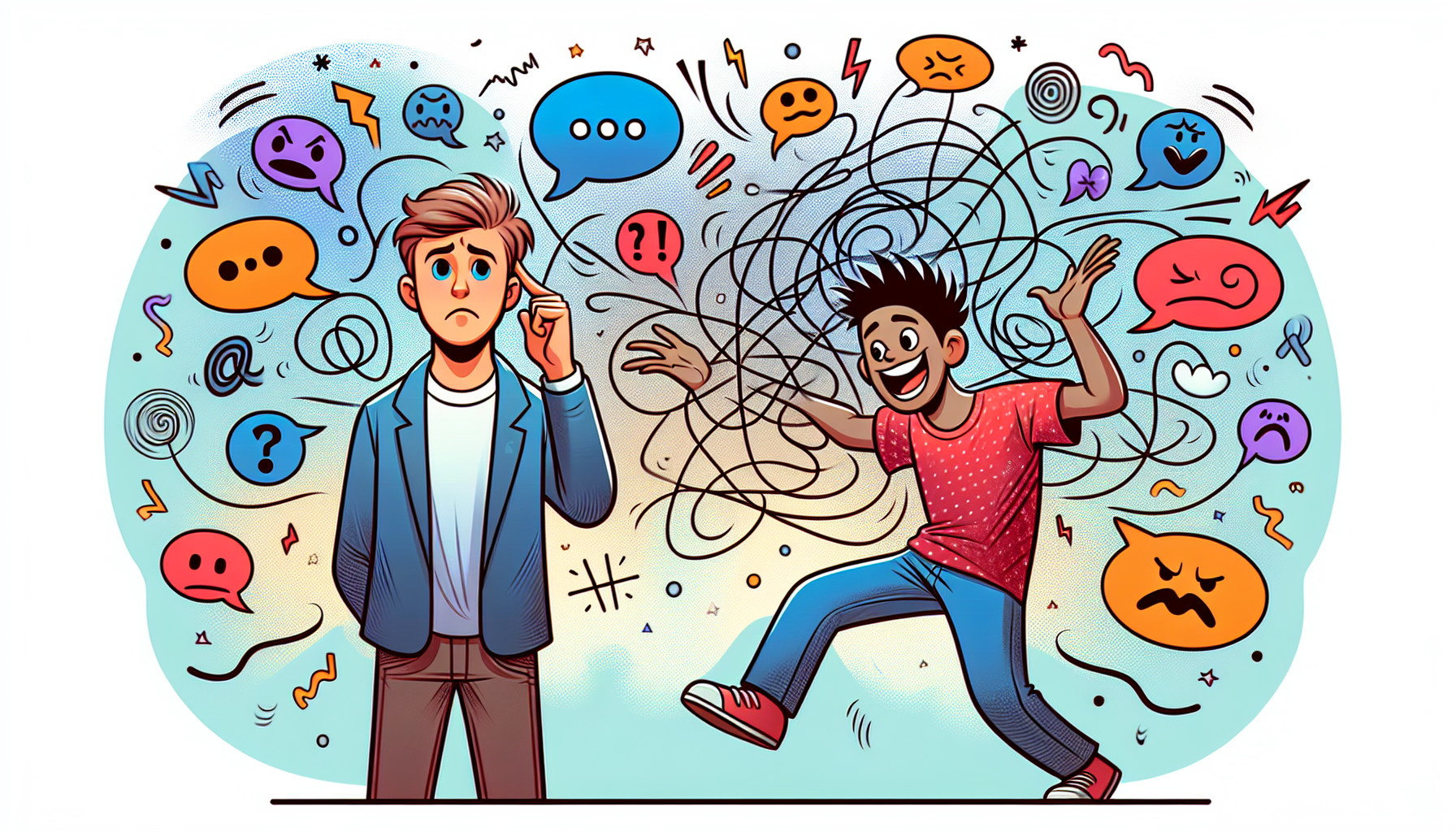Minor symptoms of autism are subtle and can easily be missed, yet recognizing them is crucial for timely support. This article will help you understand the subtle signs of mild autism in both children and adults, ensuring that individuals receive the care they need.
Key Takeaways
- Minor symptoms of autism, such as social communication difficulties and sensory sensitivities, often go unnoticed but are crucial for early identification and support.
- Early detection of mild autism can lead to timely interventions that significantly improve communication skills, behavior, and overall development.
- Support strategies, including individualized education plans and targeted therapies, are essential in helping individuals with mild autism thrive socially and emotionally.
Understanding Minor Symptoms of Autism

Mild autism, also known as level 1 autism, presents traits that are less pronounced and often masked by the individual. These traits include social communication challenges, repetitive behaviors, and sensory sensitivities, which can be subtle and easily missed. Identifying these minor symptoms helps in supporting mildly autistic individuals, who can often go undiagnosed due to their subtle nature.
Recognizing these subtle signs allows for better support for individuals with mild autism. Attention to these traits ensures that those on the mild end of the autism spectrum receive the necessary care to navigate their daily lives successfully.
What Are Minor Symptoms?
Minor symptoms of autism fall under the broader diagnosis of autism spectrum disorder (ASD), which includes what was formerly known as Asperger’s syndrome. These symptoms are generally less severe and can manifest in various ways, such as difficulties in social communication and sensory sensitivities. Individuals with mild autism may struggle with understanding and using both verbal and non-verbal cues, such as maintaining eye contact and interpreting body language.
The autism spectrum is referred to as a spectrum due to the wide range of symptoms and severity experienced by individuals, classified into three levels. Mild autism, or level 1 ASD, often requires the least support but still presents challenges that need to be addressed.
These minor symptoms can include social communication difficulties, repetitive behaviors, and sensory sensitivities, which may vary significantly from one individual to another.
Importance of Early Detection
Early detection of autism symptoms paves the way for timely support and intervention. Signs of autism spectrum disorder typically appear by age 2, but traits may become more noticeable as the child’s development progresses. Early diagnosis can markedly improve behavior, skills, and language development in children with mild symptoms, underscoring the importance of early recognition.
Implementing early intervention strategies can enhance cognitive development, potentially increasing IQ and improving overall outcomes. Early detection of mild autism symptoms helps accommodate the unique developmental needs of individuals, leading to better long-term success. Customized treatment plans also contribute to positive outcomes.
Social Communication Difficulties

Individuals with mild autism often face challenges in social interactions, including difficulties in reading social cues and understanding body language. These social communication challenges can affect an individual’s ability to form and maintain meaningful relationships, leading to feelings of isolation and misunderstanding. Mild autism can be characterized by self-absorption, making it hard to communicate effectively with peers.
Interpreting social cues can be highly challenging for individuals with minor symptoms of autism, leading to struggles in social situations and relationships, and affecting overall social and communication skills.
Verbal and Nonverbal Cues
Children with mild autism often find it challenging to utilize gestures and maintain eye contact during conversations. These difficulties can make it hard for them to engage in reciprocal conversations and understand the flow of social interactions. They may also struggle with using and interpreting facial expressions and body language, which are crucial for effective communication.
The subtle signs of difficulty with verbal and nonverbal cues can significantly impact social interactions and relationships. Early recognition of these challenges allows for targeted interventions that enhance social and communication skills, aiding individuals with mild autism in navigating social situations more effectively.
Social Nuances
Individuals with mild autism may face challenges in grasping social nuances that are essential for effective communication. They often have difficulties understanding sarcasm, which can lead to misinterpretations in conversations and social interactions. These challenges can make social interactions less fulfilling and more frustrating for mildly autistic individuals.
Reciprocal conversations pose challenges, as individuals with mild autism may struggle to keep up with social interactions and respond appropriately. These difficulties can impact social skills and relationships, often leading to feelings of isolation or frustration.
Behavioral Patterns and Sensory Sensitivities

Repetitive behaviors and sensory sensitivities are characteristic features of autism spectrum disorders. These behaviors and sensitivities can manifest in various mild forms, such as limited and repetitive patterns of behavior or heightened sensitivity to sensory inputs. Recognizing these traits is essential for identifying mild autism and offering appropriate support.
Individuals with mild autism often experience sensory sensitivities, which can influence their daily activities and require specific strategies for management. Addressing these sensitivities early helps individuals with mild autism navigate their environments more comfortably.
Repetitive Behaviors
Common repetitive behaviors associated with mild autism include hand flapping, rocking back and forth, and maintaining rigid routines. These behaviors can be seen as a way for individuals to manage sensory input and feel more in control of their environment. Repetitive behaviors are a characteristic feature of autism spectrum disorder and can manifest in various mild forms.
Addressing these repetitive behaviors aids individuals with mild autism in developing more flexible routines and engaging more comfortably in daily life. Support in managing these behaviors can enhance overall well-being and social interactions.
Sensory Experiences
Individuals with mild autism frequently have increased sensitivity to sensory inputs. This includes reactions to loud sounds and specific textures. These heightened sensitivities can influence daily activities and require specific strategies for management. Creating a sensory-friendly environment can minimize sensory overload and improve comfort for individuals with mild autism.
Early recognition and management of sensory sensitivities aid individuals in navigating their environments more comfortably. Providing sensory tools or creating quiet spaces can significantly improve the daily experiences of those with mild autism.
Diagnosing Minor Symptoms of Autism

Diagnosing minor symptoms of autism is challenging due to their subtle nature. Mild autism traits are often mistaken for personality differences, leading to delayed diagnosis. Timely diagnosis is crucial for offering the necessary support and understanding for individuals with mild autism.
If autism spectrum disorder is suspected, advocating for a professional evaluation is essential. Diagnosing adults can be challenging, as it varies by provider and is influenced by factors such as gender and age.
Diagnostic Criteria
The aim of the diagnostic criteria in mild autism is to identify the presence of autism spectrum disorder. The DSM-5 provides specific criteria for diagnosing ASD, which must be met for a diagnosis. A diagnosis of mild autism requires meeting the DSM-5 criteria. This is essential for proper evaluation and support.
Healthcare providers assess for autism diagnosis based on various criteria outlined in the diagnostic and statistical manual (DSM-5). These criteria help professionals determine the presence and severity of autism spectrum disorder, leading to an accurate diagnosis and appropriate support.
Comprehensive Evaluation
The assessment process for mild autism typically involves several professionals. These may include psychologists, psychiatrists, speech-language pathologists, and occupational therapists. The evaluation process involves collecting medical and developmental history, and assessing behavior patterns, intelligence, and social and communication skills.
Subtle traits of mild autism may lead to misdiagnosis or being overlooked during early intervention screenings. Professional evaluation is crucial for accurate diagnosis and understanding individual strengths and challenges.
Support Strategies and Interventions

Individuals with mild autism may benefit from assistance in social interactions and managing sensory sensitivities. Access to support services such as occupational therapy can greatly benefit individuals with mild autism. Understanding and support are essential for them to navigate life challenges and reach their full potential.
Individuals with mild autism can thrive with the appropriate support and resources. They can lead fulfilling lives when given the right tools and assistance. Various support options are available, including educational materials, workshops, and customized treatment plans.
Early Intervention Programs
Early intervention develops skills, improves communication, and enhances social interactions for children with mild autism. It is most effective when started during preschool years, as children’s brains are more adaptable.
Participation in social skills groups or therapy can greatly enhance social skills for individuals with mild autism. Evidence-based therapies and individualized education plans (IEPs) can help individuals with mild autism succeed.
Therapies and Treatments
Early intervention significantly enhances language skills and overall behavior in children with mild autism. Various therapies address specific challenges in individuals with mild autism, including Applied Behavioral Analysis (ABA), which focuses on behavior modification and enhancing social skills.
Early intervention programs offer targeted support and therapy, helping children with mild autism develop essential skills and improve overall outcomes.
Individualized Support Plans
Individualized Education Plans (IEPs) are tailored strategies developed by educators and specialists to support the specific needs of children with mild autism. Hobbies, exercise, and mindfulness techniques benefit the well-being of individuals with mild autism.
Self-care is crucial for emotional well-being and managing challenges faced by individuals with mild autism. Incorporating effective self-care strategies into routines helps individuals with mild autism thrive and lead fulfilling lives.
Living with Minor Symptoms of Autism
Living with minor symptoms of autism involves building strong social connections, practicing self-care, and accessing advocacy resources. Tailored coping strategies can significantly alleviate stress during overwhelming situations. Individuals with mild autism may exhibit both heightened and diminished sensory reactions.
Key aspects of living with mild autism include building social skills, managing sensory sensitivities, and promoting self-care and well-being. Advocacy resources can provide valuable support for individuals and their families.
Building Social Skills
Joining social groups can improve social skills for individuals with mild autism. These groups offer opportunities to practice social interactions and develop communication skills, essential for building meaningful relationships and navigating social situations.
Social skills training, speech therapy, and occupational therapy can help individuals with mild autism improve their social and communication skills. These interventions can enhance language development and understanding of social cues and body language.
Managing Sensory Sensitivities
Individuals with mild autism may be sensitive to sounds, pain, tastes, or other sensations. Creating a sensory-friendly environment and reducing triggers effectively manage these sensitivities.
Coping skills, like fidgeting with something under their desk, can help autistic children manage sensory input. Though often unnoticed or disregarded by others, these skills play a crucial role in helping individuals with mild autism navigate their environments comfortably.
Promoting Self-Care and Well-being
Mindfulness practices can improve emotional regulation in individuals with mild autism. Self-care routines, including hobbies, exercise, and mindfulness techniques, are essential for better emotional regulation and overall well-being. Prioritizing emotional well-being helps individuals manage the challenges of minor symptoms of autism more effectively.
Incorporating self-care strategies into daily routines improves mental health and quality of life. Focusing on self-care and well-being helps individuals with mild autism navigate daily challenges and thrive in their personal and professional lives.
Summary
Recognizing the minor symptoms of autism in both children and adults is crucial for providing timely support and intervention. From subtle social communication difficulties to sensory sensitivities and repetitive behaviors, these traits can significantly impact an individual’s daily life. Early detection, accurate diagnosis, and comprehensive evaluation are essential steps in understanding and supporting individuals with mild autism.
Effective support strategies, including early intervention programs, therapies, and individualized support plans, can help individuals with mild autism thrive. By promoting self-care, building social skills, and managing sensory sensitivities, we can create a supportive environment that allows autistic individuals to reach their full potential. Let’s continue to advocate for awareness and understanding, ensuring that everyone on the autism spectrum receives the support they need.
Frequently Asked Questions
What are some subtle signs of mild autism in children?
Mild autism in children may be indicated by difficulties in social communication, such as limited eye contact and challenges in interpreting social cues, along with repetitive behaviors and heightened sensory sensitivities. Recognizing these signs early can be crucial for support and intervention.
Why is early detection of mild autism important?
Early detection of mild autism is essential as it enables timely intervention, significantly improving behavioral skills and language development, ultimately leading to better long-term outcomes. Taking action early can profoundly influence a child's cognitive development and future success.
What therapies are effective for individuals with mild autism?
Applied Behavioral Analysis (ABA), speech therapy, and occupational therapy are effective approaches for individuals with mild autism, enhancing social skills, communication, and daily functioning. Prioritizing these therapies can lead to significant improvements in quality of life.
How can sensory sensitivities be managed in individuals with mild autism?
Managing sensory sensitivities in individuals with mild autism involves creating a sensory-friendly environment and reducing triggers. Early identification and the use of coping skills, like fidgeting tools, can significantly enhance comfort and daily functioning.
What is the role of self-care in managing mild autism symptoms?
Self-care plays a crucial role in managing mild autism symptoms by enhancing emotional regulation and overall well-being. Engaging in mindfulness, hobbies, and exercise can significantly improve quality of life.
Original content by the Upbility editorial team. No part of this article may be reproduced in any form without citing the publisher.









